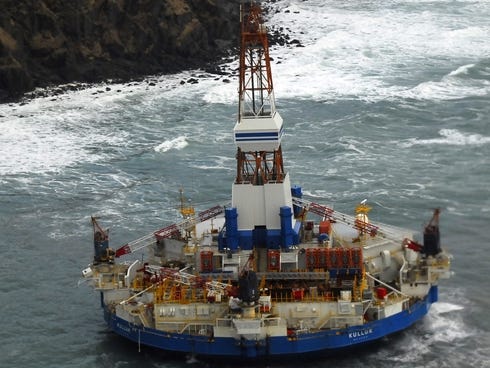
Northstar Island, an artificial island in the Beaufort Sea north of Alaska, is a site of oil and gas drilling. (U.S. Department of the Interior)
12/13/2015 By DAN JOLING Fire Engineering
While Shell proposed exploratory wells in the Chukchi Sea about 80 miles off Alaska's northwest coast, a Texas oil company wants to build a gravel island as a platform for five or more extraction wells that could tap oil 6 miles from shore in the Beaufort Sea.
The U.S. Bureau of Ocean Energy Management is deciding how to assess the environmental effect of a production plan for the Liberty Project by Hilcorp Alaska LLC, a subsidiary of Houston-based Hilcorp Energy Co.
A successful well would mean the first petroleum production in federal Arctic waters.
Hilcorp's plan for a 23-acre gravel island, about the size of 17.4 football fields, has drawn mixed reviews from conservationists and outright condemnation from environmentalists who believe the oil should stay in the ground.
Global warming is melting sea ice habitat beneath polar bears, walrus and ice seals, said Kristen Monsell, an attorney for the Center for Biological Diversity.
"The impacts of an oil spill on top of that could be devastating and would be nearly impossible to clean up," she said.....
....Hilcorp would create the island in Foggy Island Bay, 15 miles east of Prudhoe Bay, the largest oil field in North America. Last year, Hilcorp purchased 50 percent of Liberty assets from BP Exploration Alaska, which drilled at the site in 1997 and discovered an estimated 120 million barrels of recoverable oil.
BP considered building a gravel island and also "ultra-extended reach drilling" from shore. The drilling type was deemed technically unfeasible, Hilcorp spokeswoman Lori Nelson said.
Hilcorp would place conventional wells on the island, positioning them over the oil bearing rock sitting under the ocean floor.
"It's proven to be a safe and effective means for oil and gas development in the Arctic," Nelson said by email. "Alaska has a 30-year record of safely operating offshore in the Arctic."....
....For the Liberty project, trucks carrying gravel would travel by ice road to a hole cut in sea ice. The trucks would deposit 83,000 cubic yards of gravel into 19 feet of water. The work surface would be 9.3 acres surrounded by a wall, providing a barrier to ice, waves and wildlife.....
....Residents, Epstein said, worry that islands will affect the migration patterns of bowhead whales harvested by subsistence hunters. Because the oil would come from federal waters, residents would not see revenues, but would be the ones most harmed by any spill.
The project is near the Beaufort Boulder Patch, an area of undersea boulders where kelp and algae grow in contrast to the otherwise soft ocean bottom.
The environmental review won't be completed until at least 2017, and production could be several more years off.
At the end of production, Hilcorp says it would plug the wells and remove slope protection, allowing ice and waves to erode the island. entire article here
